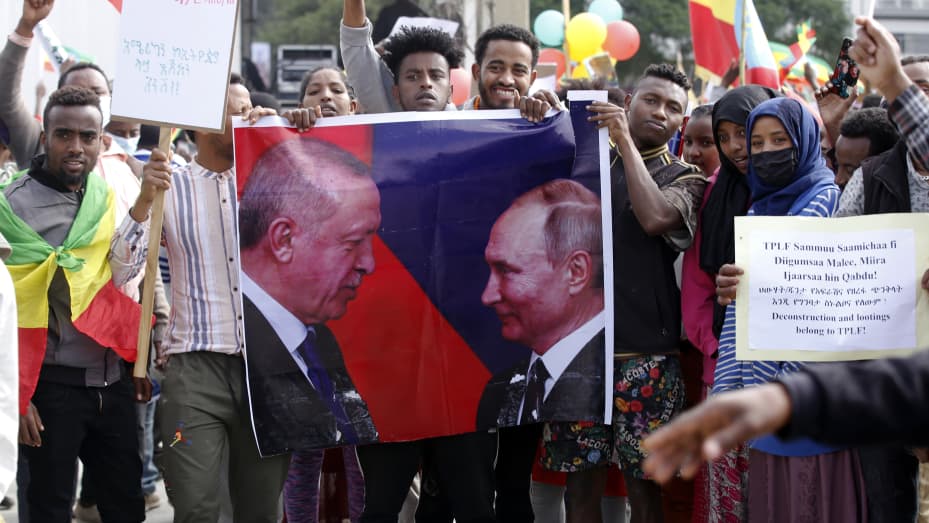
Russia is challenging the status quo in Africa, using insecurity and diplomatic disputes with Western powers as a springboard to expand its presence on the continent.
From Libya to Nigeria, Ethiopia to Mali, Moscow has been building key strategic military alliances and an increasingly favorable public profile across Africa in recent years.
Central to this effort is offering alternatives to countries that have grown disgruntled with Western diplomatic partnerships.
The second Russia-Africa Summit is scheduled for 2022. At the inaugural summit in Sochi in 2019, President Vladimir Putin vowed that Russia was “not going to participate in a new ‘repartition’ of the continent’s wealth; rather, we are ready to engage in competition for cooperation with Africa.”
Via the U.N., Russia has also provided aid in the form food and medical assistance alongside its growing commercial, economic and military support across the continent.
Russia’s bilateral push
In the past two months alone, Russia has signed military cooperation agreements with Nigeria and Ethiopia, Africa’s two most populous nations.
The Stockholm International Peace Research Institute estimates that Africa accounted for 18% of Russian arms exports between 2016 and 2020.
Russian mercenaries have also provided direct assistance to governments in Libya and the Central African Republic, according to the U.N. However, the Kremlin has denied links to the Wagner Group, a paramilitary organization alleged by the U.N. to be aiding human rights abuses in the region.
“A group of Russian instructors was sent to the CAR at the request of its leaders and with the knowledge of the UN Security Council Sanctions Committee on the CAR established by Resolution 2127,” a Russian foreign ministry statement said in July. “Indicatively, none of them has taken part in combat operations.”
Reuters reported in July that U.S. lawmakers had stalled a planned $1 billion weapons sale to Nigeria over allegations of human rights abuses by the government.
Less than a month later, Russia signed a deal with President Muhammadu Buhari’s administration to supply military equipment, training and technology to Nigerian forces.
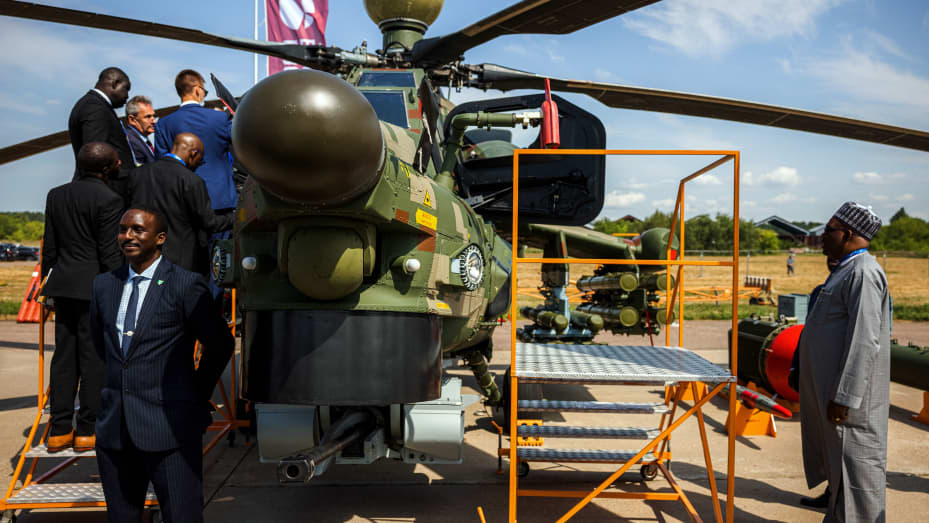
Although historically a key diplomatic and trade partner of the U.S., Buhari’s government found itself at odds with Washington amid the #EndSARS protests in 2020, and again after a recent fallout with Twitter.
Meanwhile, Islamist militant groups such as Boko Haram and the Islamic State’s West Africa Province have cotinued to wreak havoc in the northeast of the country.
This confluence of factors paving the way for Russian influence-building was also at play in Ethiopia. Russia has provided support for Prime Minister Abiy Ahmed’s government after Western governments balked at his forces’ military response to an insurgency in northern Tigray.
Ethiopia felt the U.S. in particular was aligning with Egypt in the ongoing dispute over the Grand Ethiopian Renaissance Dam. U.S. Secretary of State Antony Blinken further evoked the ire of Addis Ababa in March by accusing forces in Tigray of “ethnic cleansing.”
Russian Foreign Minister Sergey Lavrov then met with Ethiopian counterpart Demeke Mekonnen in June. Moscow proceeded with the deployment of election observers to Ethiopia, whereas the EU withdrew its observers, citing “ongoing violence across the country, human rights violations and political tensions, harassment of media workers and detained opposition members.”
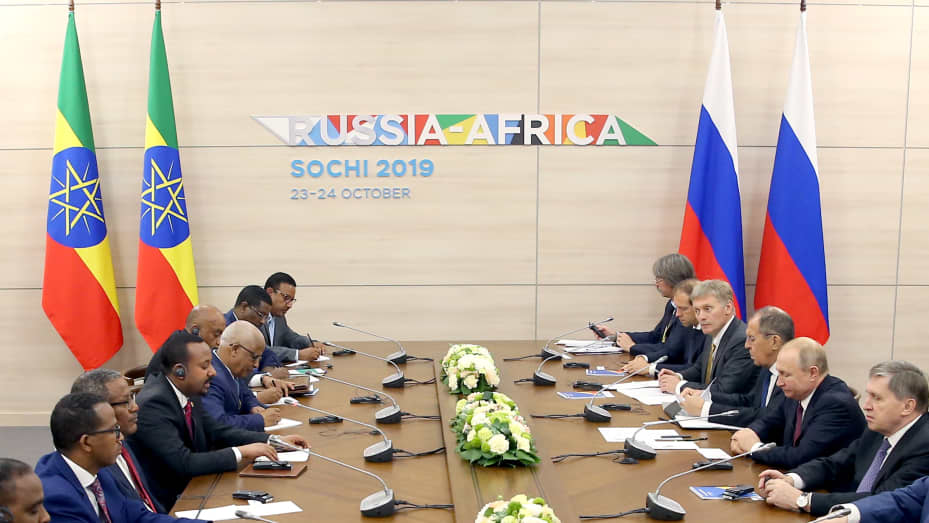
Russia has supplied strategic weapons both as a potential defense against any Egyptian strike on the GERD and to aid government forces in Tigray.
“Gains by the Tigray Defence Force (TDF), which has captured parts of the Afar and Amhara regions in recent weeks, make the provision of desperately needed weapons all the more important for Addis Ababa, and Moscow is likely to oblige to such a request, possibly on a buy-now-pay-later basis,” said Louw Nel, senior political analyst at NKC African Economics.
In what Nel flagged as a “sign of things to come,” Ethiopia and Russia signed a military cooperation agreement in July, focused specifically on knowledge and technology transfers. However, Nel noted that Ethiopia will be “wary of allowing Russian personnel to be deployed there in anything other than a training capacity.”
Russia’s foreign ministry was not immediately available for comment when contacted by CNBC.
U.S. ‘creeping build-up’
The U.S. has pledged to reignite its economic and commercial engagements in Africa, but a planned drawback of troops is giving way to extensive spending on operational bases and longer-term plans to sustain a strategic presence, according to a recent report from risk intelligence firm Pangea-Risk.
In 2018, then-U.S. national security advisor John Bolton singled out Russia’s expansionist “influence across Africa,” and Washington has been keen to retain a foothold on the continent.
The Biden administration is set to maintain the U.S. military’s 27 operational outposts on the continent, while the country’s Africa Command (Africom) is prioritizing counter-terrorism objectives in the Horn of Africa and the Sahel regions.
The U.S. is also establishing a presence in other strategically important regions, such as the Red Sea and the Gulf of Guinea. Some $330 million is reportedly being spent by 2025 on U.S. military base construction and related infrastructure projects, while Africom is drawing up a 20-year strategic plan.
This will focus on counterterrorism, special forces operations and humanitarian support, along with safeguarding U.S. commercial interests in the face of growing Chinese and Russian presence.
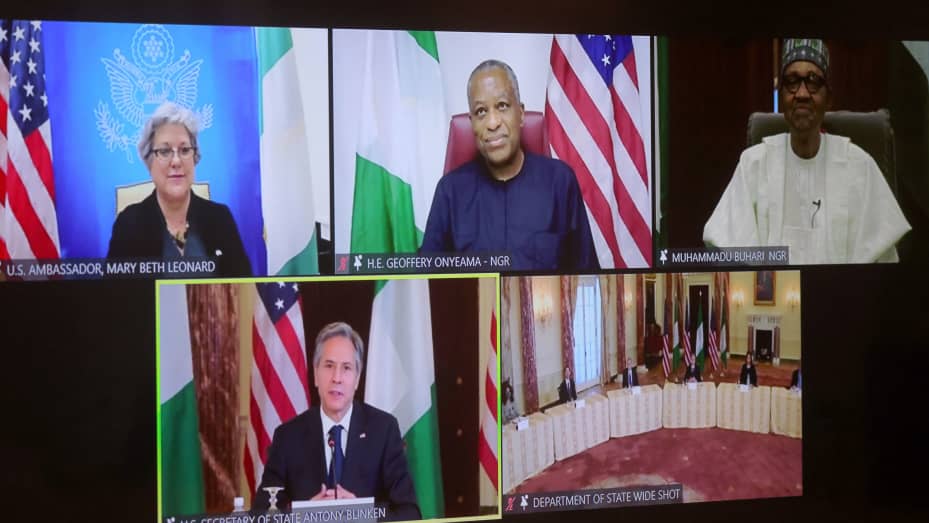
The report noted that Cape Verdean authorities have since July 2020 agreed a Status of Forces Agreement with the U.S. military to allow U.S. troops to operate from its archipelago.
“Such an agreement makes sense given global geo-political competition in the West African region and the need to counter the growing risk of piracy in the Gulf of Guinea, both of which pose an existential threat to U.S. commercial interests,” Pangea-Risk CEO Robert Besseling said.
“However, the one-year-old SOFA with Cape Verde raises questions over broader U.S. diplomatic and judicial engagements in the country, and whether this sets a pattern for U.S.–Africa relations going forward.”
International Crisis Group Africa Program Director Comfort Ero, has said the “creeping build-up” of U.S. military on the continent was accompanied by mixed messaging, accusing both the U.S. and African governments of a lack of transparency.
The U.S. is likely to phase out its direct military presence in insecurity hotspots, but continues to seek SOFA deals with countries of strategic importance, Pangea-Risk said, adding that Washington will be reluctant to withdraw entirely due to Chinese and Russian presence.
France struggles in the Sahel
France maintains the largest presence and troop numbers of any former colonial power in Africa, particularly in the form of 5,100 troops in the Sahel, where the border area between Mali, Burkina Faso and Niger meet has become a hotspot for violence.
“Paris is inconsistent in its treatment of friendly regimes, indulging an unconstitutional transfer of power in Chad but taking a harder line following a coup in Mali,” said NKC’s Nel.
French President Emmanuel Macron supported a military-led transition from Chadian President Idriss Deby, who was killed in battle with rebel forces in April, to his son. This violated the country’s constitution and led to anti-French protests and the vandalism of a Total petrol station.
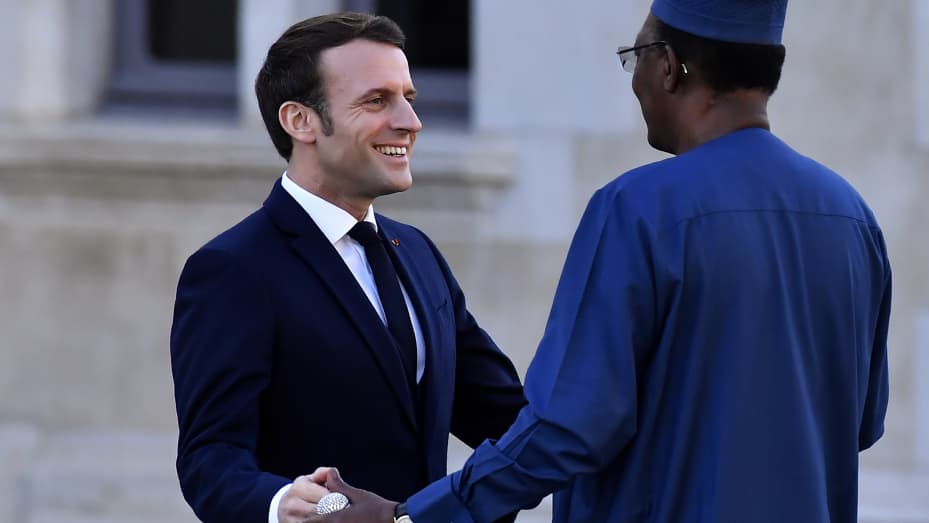
However, when Colonel Assimi Goïta established military rule in Mali, Macron denounced the coup and suspended a joint military operation with the Malian army. Protests in the aftermath were also hostile toward France, while Russian flags and posters were visible.
“Given the clear negative trend in political stability in Mali, there is reason to consider the danger that it might end up looking like the CAR, where President Faustin-Archange Touadéra’s weak government is essentially kept in place by Russian muscle: the mercenaries of Yevgeny Prigozhin’s Wagner Group,” Nel said.
Source=Russia is building military influence in Africa, challenging U.S., France (cnbc.com)




















